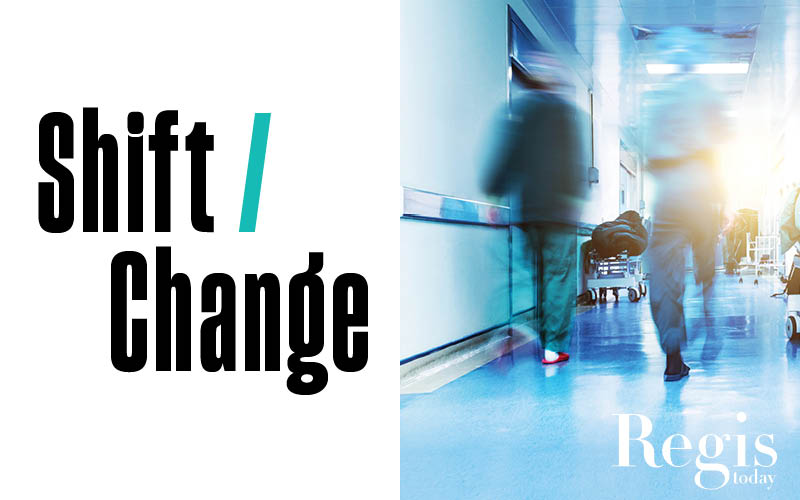
Nursing school applications are on the rise as people change careers amid a global pandemic
Story adapted by Kristen Walsh
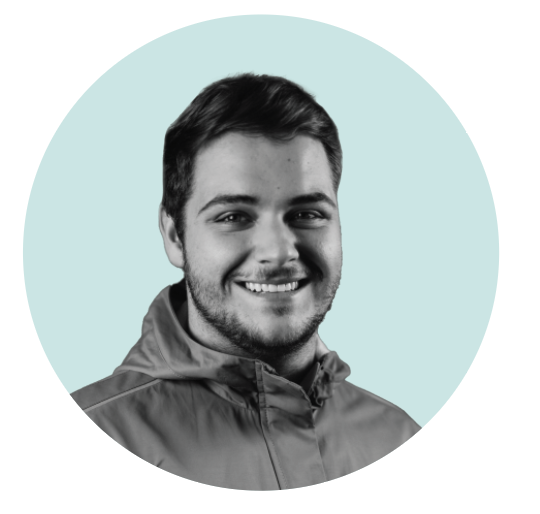 Justin Andrews, ABSN ’22 was a 25-year-old personal banker when he got a nagging feeling of regret about his career choice. It was February 2020 and the COVID-19 virus was heading toward pandemic status. Health care workers, including Andrews’ aunt who is a nurse, were putting their own lives at risk to work the front lines. And he wanted to be there.
Justin Andrews, ABSN ’22 was a 25-year-old personal banker when he got a nagging feeling of regret about his career choice. It was February 2020 and the COVID-19 virus was heading toward pandemic status. Health care workers, including Andrews’ aunt who is a nurse, were putting their own lives at risk to work the front lines. And he wanted to be there.
“Seeing my aunt work so hard in the emergency room and watching the news showing the nurses battling the virus made me want to join the fight with even more passion,” Andrews recalls. “Pandemics happen, but we need people to help others.”
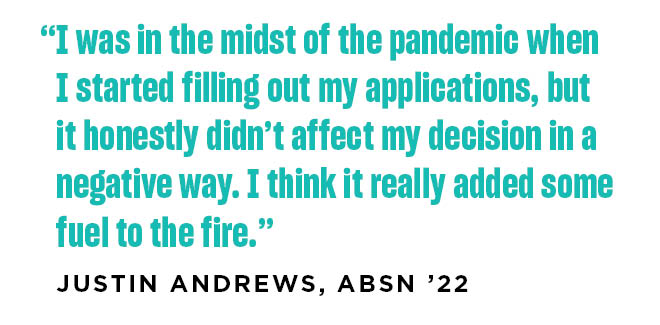 He applied to the 16-month Accelerated Bachelor of Science in Nursing (ABSN) program at Regis. “I was in the midst of the pandemic when I started filling out my applications, but it honestly didn’t affect my decision in a negative way. I think it really added some fuel to the fire.”
He applied to the 16-month Accelerated Bachelor of Science in Nursing (ABSN) program at Regis. “I was in the midst of the pandemic when I started filling out my applications, but it honestly didn’t affect my decision in a negative way. I think it really added some fuel to the fire.”
Andrews received a bachelor’s degree in psychology and communications from Worcester State University, although he admits that nursing had been on his mind since high school. When he finally decided to explore a career shift into nursing, he spoke with longtime bank client Ann Fryer, who just happened to be an associate professor of nursing at Regis.
“Justin is a very empathetic, compassionate person,” Fryer says of Andrews’ interaction with bank customers. “Observing him during the COVID-19 crisis, I watch him talk to people who are bringing all sorts of baggage and fear with them. I think that running toward the fire is part of what nurses do. We put out fires all the time. I think he will do very well.”
Andrews likens the rigor of the Regis program to an Olympic torch. “It’s like a fire burning under you. It has pushed me and my peers to get the gold. After the first few weeks, my cohort developed a flow and time management; getting everything done became second nature.”
He continues, “My cohort is full of people with such kind hearts and powerful brains; it really feels like a family. I know they will all make great nurses.”
Silver Lining
The pandemic also influenced career plans for Jacqueline Gorman, ABSN ’21. As the economy shut down in March 2020, so did the wellness company she had opened on Boston’s south shore a year-and-a-half prior. But, she discovered a silver lining.
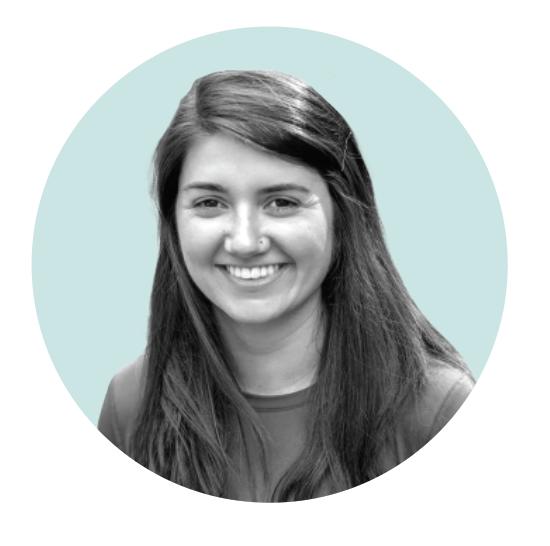 “I began my practice by working in two different wellness centers and quickly developed a craving to learn more and become a stronger advocate and practitioner for my clients,” Gorman says of her business, Sovereign Wellness. “Along the way I met nurses and nurse practitioners who inspired me to gain stronger clinical experiences to fill that hole I was looking to fill. While the pandemic took my business, it allowed me to focus on the greater goal of becoming a family nurse practitioner.”
“I began my practice by working in two different wellness centers and quickly developed a craving to learn more and become a stronger advocate and practitioner for my clients,” Gorman says of her business, Sovereign Wellness. “Along the way I met nurses and nurse practitioners who inspired me to gain stronger clinical experiences to fill that hole I was looking to fill. While the pandemic took my business, it allowed me to focus on the greater goal of becoming a family nurse practitioner.”
At the encouragement of family members in nursing, she chose Regis’ ABSN program. “I wanted an education that would really support me from day one to finding a job in a major Boston hospital after my RN licensure.”
Gorman has two undergraduate degrees—one in environmental studies with a concentration in sustainable food systems, and a second in communication, advocacy, and social change.
“At that time, I had become enamored with the local food movement while seeking out healthier ways of living after my mother’s diagnosis of breast cancer,” she recalls.
Gorman worked as a farmer, event planner, and private chef on Martha’s Vineyard until the grueling hours caused chronic health problems. She found relief in brain integration, a complementary therapy based on techniques of acupressure, applied kinesiology, and physiotherapy. And she also found a new career interest.
“I became amazed by the role you could play in other people’s lives while helping them overcome significant challenges with diagnoses like ADHD, dyslexia, emotional trauma, and post-traumatic stress,” she says.
After continuing her education, Gorman became a brain integration practitioner and integrative health coach and opened Sovereign Wellness. She is both proud and humble as she describes the next step in her journey: becoming a nurse.
“I think what surprised me as I started in my first semester at Regis was how capable I was of doing this program,” Gorman says. “I was always scared of nursing programs and thought they were impossible, but if you have a dream to cling onto as you go through the program, it helps you persevere.”
Plus, she adds, “I feel supported and cared for as a student. In each class, my professors inspire me on the type of nurse I want to be, and not just the title of RN. I’m inspired to build the precision, intelligence, humility, and humor of a nurse.”
A Dedicated Cause
Like Gorman, Timothy Abbott, ABSN ’23 also comes from a family of health care practitioners. As a nationally trained paramedic, he has treated and transported so many COVID-19 patients that he “has lost track.” The nature of his job is to provide emergency treatment of a life-threatening illness and transport patients by ambulance to the hospital. 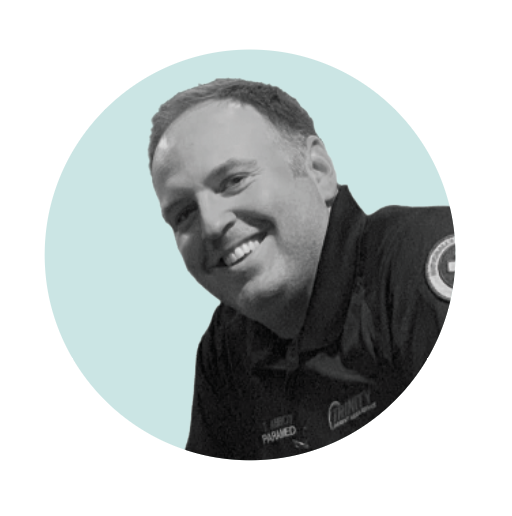
“Paramedicine is very rewarding, but after I treat a very specific illness, I leave the patient in the emergency department,” Abbott says. “I want to spend more time with my patients. My end goal is to be a nurse practitioner and treat those patients after the paramedics leave.”
Choosing the Regis ABSN program to help him reach that goal was easy. Several people he knows—including his wife Katelynne Lyons Abbott, BSN ’06, FNP ’08—completed graduate and master’s degrees in nursing at Regis.
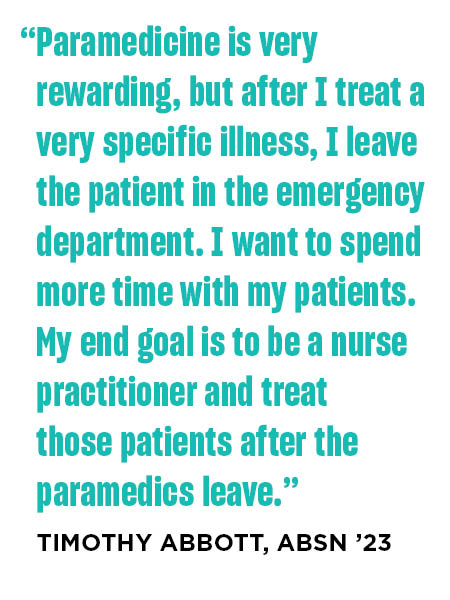 Abbott holds an undergraduate degree in communications and worked in the mortgage industry for six years. He decided to make a change after witnessing a significant motor vehicle crash. At the time, Abbott was volunteering for the Haverhill, Massachusetts, auxiliary police department but was off duty.
Abbott holds an undergraduate degree in communications and worked in the mortgage industry for six years. He decided to make a change after witnessing a significant motor vehicle crash. At the time, Abbott was volunteering for the Haverhill, Massachusetts, auxiliary police department but was off duty.
“One driver was very injured,” Abbott recalls. “While I helped where I could, I did not have the skills of an EMT. So that night is when I registered for the EMT-B class.”
A few years after becoming an EMT, Abbott completed the Paramedic Technology program at Northern Essex Community College. The intensive training included pharmacology and life-saving skills like intubation and cardioversion both with medication and electricity. Abbott also spent more than 250 hours in the emergency department and operating room working with nurses and physicians, plus an additional 250-300 hours riding on an ambulance with senior paramedics.
“I am excited for how Regis is preparing me for the next journey in my health care career,” Abbott says. “Regis has graduated so many outstanding nurses and NPs and I feel honored that I will be among so many great providers in the future.”
Abbott, Andrews, and Gorman are not alone in their pursuit of a nursing degree during the pandemic. Between March and August 2020, the accelerated nursing programs at Regis received 117 percent more inquiries than in the same period the year before. Applications were up by 40 percent in both spring and fall 2020.
“Nursing schools are experiencing an increase in applications, particularly from individuals with a previous non-nursing degree,” says Donna M. Glynn, PhD, RN, ANP, associate dean of pre-licensure nursing and associate professor. “These individuals report that they want to make a difference and contribute to health care and underserved populations. Many startling health disparities and social inequities came to the forefront through the crisis.”
Learn more about the Young School of Nursing at Regis: regiscollege.edu/nursing.
Read more articles
Read the entire magazine online